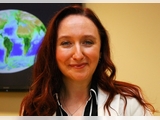Craig as Scientific Lead with SARP-East
For eight weeks this summer, undergraduate students, all college rising seniors, will be part of the inaugural Student Airborne Research Program (SARP) - East. SARP-East was created on the heels of the successful SARP-West. The students will be conducting research, developing a hypothesis, presenting their findings, and working on a practice research proposal.
Susanne Craig (616/UMBC) recently was appointed as scientific lead for the 'Surf' or aquatic aspect of the program. We asked Dr. Craig for more details about the upcoming workshop and her role.
"I am collaborating with other faculty mentors to design the observation campaign that will investigate the aquatic aspect of SARP. These include colleagues from Virginia Commonwealth University, US EPA, Virginia Institute of Marine Science, and our wonderful graduate mentor from the University of Alabama. We will be conducting studies of the James River all the way down to the Chesapeake Bay using various approaches that include optical measurements, biogeochemical laboratory analyses of water samples, physical measurements of the water column, studies of tagged fish, and good old-fashioned examination of water samples under a microscope."
We were curious about any specific research goals with the selected site being the Chesapeake Bay.
"This [area] is a complex system where anthropogenic factors strongly influence the land, waterways, and atmosphere. We want to have a strong focus on the coupled human natural system of the Surf, Turf, Above the Earth and how they fit together. We have designed the program to have a strong interdisciplinary slant that involves surface to space, nose height to satellite, ground to geostationary."
We inquired about the goals for the students.
"The overall goal is to perform integrated observing strategies to address complex, process oriented Earth System Science goals. This involves studying processes in aquatic, terrestrial, and atmospheric systems. We want the students to have a "small bite" of a larger problem with an intrinsic focus on how we might scale our observations, i.e., whether that's from a point measurement to a satellite pixel, or to planet scale or the reverse. To achieve this, we'll be utilizing airborne NASA observing assets, such as NASA Langley's B200, SR-22, and Gulfstream III aircraft, and Dynamic Aviation's B200, uncrewed aerial vehicles (drones), ship-based observations, and in situ observations of various terrestrial systems."
We wondered what Dr. Craig is most looking forward to in working with the students.
"What I most look forward to is getting students excited about Earth system science - understanding that our water, land, and atmosphere is a connected system. If that piques their interest in pursuing studies in science, policy, environmental justice, or anything related, then I'd take that as a huge win! An even bigger win would be to engage folks who otherwise might not have considered such a career. I'm also hoping that we are beginning to dismantle some of the barriers to participation in such studies by ensuring that our recruitment process reaches out to communities of people who have been historically underrepresented in all of these fields. Justice, equity, diversity, and inclusion in our field is of huge importance to me. I am chairperson of The Oceanography Society's JEDI committee and I strongly believe that this aspect of being a scientist in my community is as important as the scientific studies."
Participating students come from all around the country, and Dr. Craig provided an image of this year's geographic distribution. Note, applications for SARP are now closed for this year. The next application period will run from around November 2023 - January 2024.
Posted: June 1, 2023, 1:43 PM
